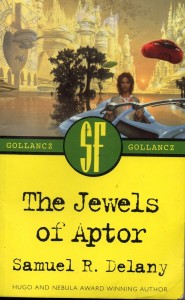Book Review: The Jewels of Aptor by Samuel R. Delaney
This is the first novel by Samuel R. Delaney, published in 1967. He was one of the first successful African-American science fiction authors, as well as one of the first openly gay SF writers, and certainly the most successful person so far to be both. He’s associated with the New Wave movement of the late 1960s and early 1970s, although this particular novel is closer to the old model of SF.
Geo, a poet, his sailor friend Urson, and a Strange One thief nicknamed Snake are recruited by the White Goddess Argo to travel to the semi-mythical island of Aptor and steal a jewel from the Dark God Hama. Along the way they are joined by another sailor, the “Negro” Iimmi who has been to Aptor before. Soon they are dealing with monsters, cults and ruined cities. And of course, the quartet has not been told the entire truth about just why Argo wants those jewels.
While the setting looks at first glance like fantasy, it is indeed science fiction, as is made clear by a ruined city with a cracked nuclear reactor in it. Some things don’t quite make sense in the history timeline, and that’s a plot point.
Some points in the novel are suggestive if one knows the author’s history; “Black Dude Dies First” is inverted, with the first person on the voyage to die being a pale-skinned man named “Whitey.” Iimmi turns out to be well-educated for a sailor, being on sabbatical from his college studies. And there’s a distinct lack of the kind of perfunctory hetero romance subplot that often got shoved into science fiction stories of the period.
Oh, there’s a pretty damsel, but by the time our heroes finally meet her, she’s in the middle of her own escape, not very much in distress at all. Much more time is spent on the men’s strong friendships. Still, most of the time it’s a fairly conventional fantastic adventure story. (You can even see traces of The Lord of the Rings.)
A confusing prologue is referred back to at the end, with a bit of the changes in thinking caused by paradigm shifts that would become a major theme of Mr. Delany’s work.
Like many first novels, it’s not quite up to the standards of the author’s later work, but it’s good of its kind and well worth looking up at your library.


1 comment
Comments are closed.